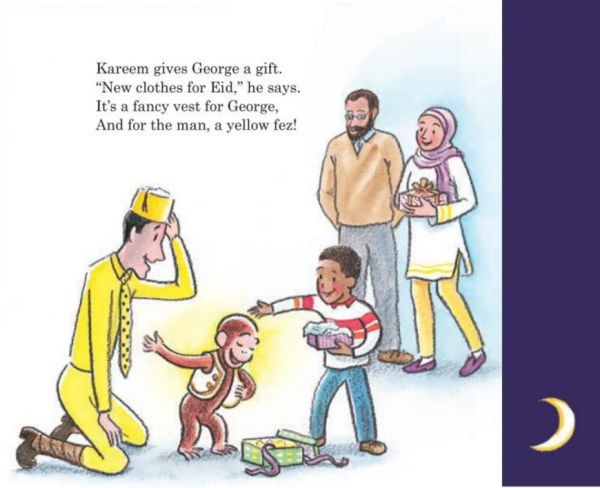
Young readers can learn about the 30 days of the Islamic month of Ramadan in 14 pages of a new book called “It’s Ramadan, Curious George.”
In this small book, Curious George and his friend Kareem fast for 24 hours, have an evening meal, do good deeds, and celebrate Eid al-Fitr with new clothes and a feast. The man in the yellow hat wears a yellow fez on the last page. (A fez is “a flat-topped conical red hat with a black tassel on top, worn by men in some Muslim countries.”)
People are celebrating this as a timely tome to combat the political divisiveness of the day. American author Hena Khan wrote the book in four-line rhymes like the 1941 original by Margret and H.A. Rey.
But does this new book honor the Reys’ legacy?
George’s creators were both Jews who were born in Germany and had to flee Paris by riding their homemade bicycles in June 1940 just as the Nazis were preparing to invade. They couldn’t take very much with them, but they did carry a manuscript that would later become “Curious George.” Though the Reys only wrote a total of eight Curious George books, books on the character would eventually sell 27 million copies and catalyze several movies.
It’s obvious that the authors who continued the Reys’ legacy have tried very hard to honor the author’s original artwork and ideas. And the Ramadan book is an effort to do the same. But does it?
The book portrays Islam as one of many faiths that exist in America — this much is true. However, hundreds of millions of Muslims hold views that the Reys would find staggering and intolerable… and not unlike the Nazis they fled that summer day in 1940.
Perhaps Curious George’s friend Kareem is a peace loving Muslim. Obviously, not all are hateful. However, a shocking number of Muslims hold — and express — anti-Jewish views, which has created a world in which jihadist violence rocks the news every few weeks. This is not — as the culture wants us to believe — a small minority of an otherwise peaceful religion, but a natural outgrowth of a religion wracked with anti-Semitism.
For example:
Majorities of Muslims in Egypt and Pakistan support the death penalty for leaving Islam
Saudi Arabia anti-Israel terrorism is so prevalent that a telethon once raised $100 million to support the 2002 intifada.
As my husband David French wrote, “Islam has a problem. It is Muslims’ responsibility to reform their own faith. It is America’s responsibility to defend itself and its citizens. Neither goal is advanced by telling convenient, politically correct lies.”
I’m sure Hena Khan attempted to honor the legacy of the Reys in this book, especially in this contentious time when a ban on Muslims in this nation has been proffered by the GOP nominee. However, to effectively combat the xenophobia of the day, we must not shove the xenophobia of Muslims under the prayer rug.










